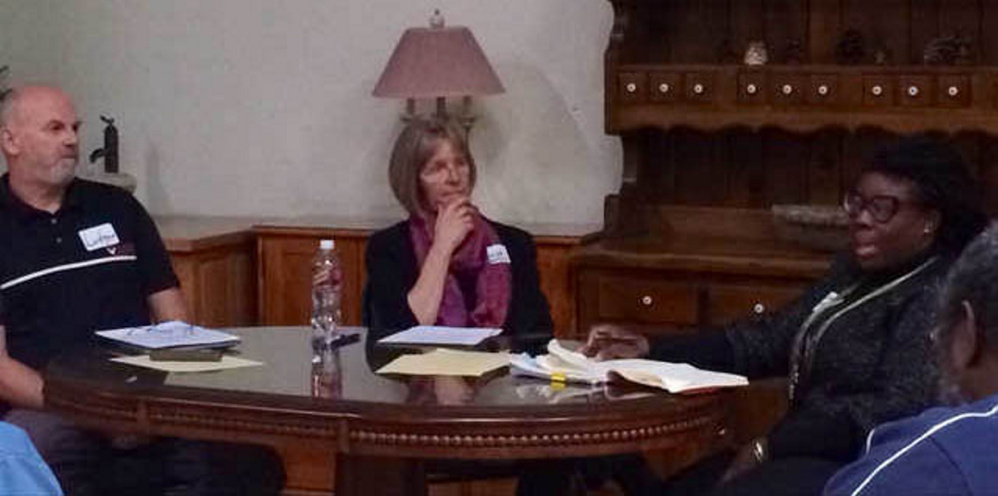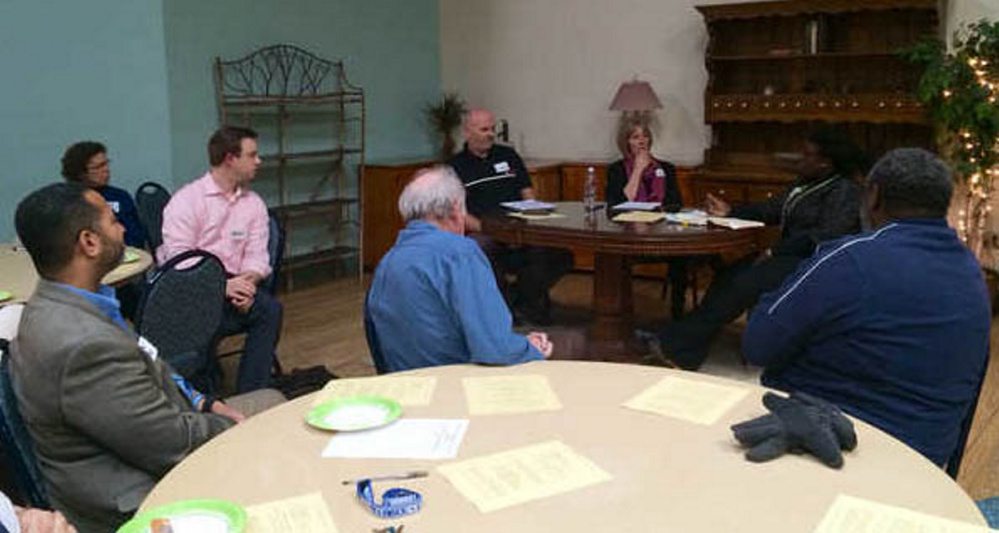WATERVILLE — Ludger Duplessis calls himself a racist, yet he was among several people who recently criticized Gov. Paul LePage for his racially charged comments on black drug dealers in Maine at a community forum on race relations.
“I come by it honestly,” said the 60-year-old clinical social worker on a recent night at the REM Center downtown, explaining that when he was a child growing up in the mostly white town of Van Buren, racist ideologies were passed down in his family and reinforced by others around him. He never saw a person of color until he was 16.
“When I went to college, there were African Americans in my classes, but I didn’t socialize with them,” he said. “I didn’t really know why until I was on a bus in St. Louis, Missouri, on my way to Los Angeles. I looked around and I was gripped with fear. I was the only white person and I didn’t even know why I was afraid, but I was really scared.”
Today Duplessis said he still considers himself a racist, though it is something he works to overcome every day, and he believes that many Mainers of similar backgrounds might face the same challenge. When it comes to comments like those made by LePage at a Jan. 6 public meeting in Bridgton, Duplessis said things need to change.
On Wednesday night he described his experience as one of three program facilitators at An Evening Conversation About Race in Our Community, a discussion on race in Waterville hosted by Colby and Thomas colleges.
“Most people in our area will say we don’t have that problem here when it comes to racism, but that’s not the experience of many people of color,” said Julie de Sherbinin, another program facilitator and one of the organizers of Wednesday night’s community discussion.
About 15 people attended the discussion, which follows two on-campus discussions about race at the colleges in the last year, and was focused on ways the Waterville community and Maine community can be more welcoming to minorities and outsiders.
The panel also focused on recent comments made by LePage that implied that drug dealers in Maine are predominantly black. Many people at Wednesday’s forum agreed that the comments were not only insensitive, but also inaccurate. Adrienne Bennett and Peter Steele, spokespeople for the governor, did not respond to requests for comment Friday.
“It’s one thing when something big happens,” de Sherbinin said, referring to LePage’s comments, “but what are all the myriad of other things that we, as white people, signal without knowing? That’s part of what we want to think about.”
Tashia Bradley, the senior associate dean of students and diversity, inclusion and equity programs at Colby, agreed, saying that a lack of diversity in Maine may be an indication that the state is not welcoming to outsiders.
Bradley, who is black, said she and friends have had several experiences in which they were made to feel uncomfortable because of their race both in Maine and in her home state, Florida.
“I think what makes it really hard being in a space like Maine — where you’re one of just a few (people of color) — is that it can be very isolating but also very frightening. You’re not really sure who you can connect to and who will help you when you find yourself in a situation,” she said.
Bradley said she often sees a car with a Confederate flag on it driving around the city.
“In my mind, I thought, ‘Why would there be a Confederate flag? Maine didn’t fight in the Confederacy.’ I think about that. What about this place makes that person feel like that’s a comfortable experience for them?” she said.
Joe Atkins, assistant dean of students at Colby, said that often a small behavior can begin to seem aggressive to another person if it happens repeatedly, and is a common manifestation of racism.
Bradley brought up an example of a store clerk in Waterville who once asked her, “Are you just passing through?”
The clerk seemed friendly and perhaps did not realize that his comments affected her, she said, or that she took it as an indication she had been singled out, perhaps because of the color of her skin.
“I didn’t find it as welcoming as maybe he thought it was,” she said. “The language he used I just couldn’t understand. I just thought, ‘Is that something you normally ask people in Maine, is whether they’re just passing through?’ Or is that something he said to me specifically to single me out?’ It doesn’t seem like very much, but it was just an odd interaction.”
Duplessis, said his wife, who is also Japanese-American, has run into similar situations, such as being the only person in a store to be asked for an ID when white customers are not.
“It’s those kind of things that really let you know you’re different. It’s those small things day in and day out that become an issue,” he said.
Some white residents who attended Wednesday’s discussion said they didn’t realize that people in Waterville felt that way.
“A lot of it comes from who our mother and father were,” said one resident, Elery Keene, who, like Duplessis, said he grew up surrounded by prejudice.
Keene added that he feels “there is not enough being done” to address the problem of race, especially when it is a topic that is so often seen in the news.
“What I’m most struck by is this bubble that’s sort of the white bubble we live in in Maine,” another resident said. “I keep thinking about (a story in ancient Greek philosophy) where a group of people grew up in a cave without the ability to use their eyes, and one person went out and said, ‘Oh, you should see what’s out there.'”
Duplessis said moving beyond racist tendencies has been a challenge that he said he still works on today.
“It took a lot of soul searching,” he said. “It took talking to people who are like me but also some really caring individuals of color who chose to help educate me on stuff I was ignorant about.”
The recent comments by LePage are also a good starting point for many Mainers to look at the way they interact with and speak about others, Bradley said.
“If you want people to see Maine as a viable place to live or relocate, that’s an example of how it will not happen,” she said. “People hear that and they think, ‘What is my place in this?’ Also, people will wonder, ‘What happens here on a regular basis?'”
“I think it’s a good starting point for looking at ourselves and investigating why that kind of statement can kind of consistently reappear and in a way that can make it hard for people to want to be here,” she said. “It says this is who we are, regardless of whether that’s who we are or not.”
Rachel Ohm — 612-2368
Twitter: @rachel_ohm
Copy the Story LinkSend questions/comments to the editors.





Success. Please wait for the page to reload. If the page does not reload within 5 seconds, please refresh the page.
Enter your email and password to access comments.
Hi, to comment on stories you must . This profile is in addition to your subscription and website login.
Already have a commenting profile? .
Invalid username/password.
Please check your email to confirm and complete your registration.
Only subscribers are eligible to post comments. Please subscribe or login first for digital access. Here’s why.
Use the form below to reset your password. When you've submitted your account email, we will send an email with a reset code.